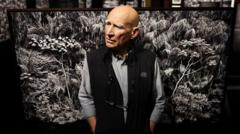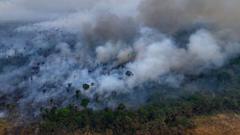Sebastião Salgado, famed for capturing the raw essence of humanity and nature, has died at 81, leaving behind a profound impact on the worlds of art and environmentalism.
Sebastião Salgado: Celebrated Photographer Leaves an Enduring Legacy

Sebastião Salgado: Celebrated Photographer Leaves an Enduring Legacy
Renowned for his evocative imagery, Sebastião Salgado has passed away, marking the end of an era in documentary photography.
Salgado, a Brazilian-born artist, dedicated five decades to portraying the stark realities of injustice, beauty, and the intertwined fates of people and nature through his lenses.
In a career that spanned 130 countries, Salgado became known for compelling black-and-white photographs that illustrated monumental global events. His notable works included harrowing images of the 1994 Rwandan genocide, scenes of devastated landscapes during the Gulf War, and poignant depictions of the 1984 Sahel famine in Africa. The Instituto Terra, an environmental organization founded by Salgado and his wife, Lélia Wanick Salgado, paid tribute to him, stating, "His lens revealed the world and its contradictions; his life, the power of transformative action."
Salgado's photography often returned to his homeland of Brazil. His striking images captured the plight of workers in open-cast gold mines and the intricate lives of indigenous peoples from the Amazon rainforest. In a heartfelt reflection on his career, he once pondered, "Sometimes I ask myself, 'Sebastião, was it really you that went to all these places?'" It was indeed him who journeyed into remote forests, oil fields, and mines, documenting humanity's most vulnerable moments and triumphs.
His final ambitious project, "Amazônia," cherished the beauty and fragility of the rainforest while advocating for its indigenous inhabitants. Over seven years, Salgado captured the daily lives of various tribes, highlighting their traditions and struggles. The project culminated in a moving exhibition featuring over 200 striking black-and-white photographs exhibited in London's Science Museum in 2021 and at the Science and Industry Museum in Manchester the following year.
Salgado, a former economist turned photographer, began his career in 1973, capturing international assignments and later co-founding Amazonas Images in 1994 with his wife. His contributions to photography earned him recognition, including the Sony World Photography Awards' Outstanding Contribution to Photography in 2024, the Prince of Asturias Award, and the honor of being a Unicef Goodwill Ambassador.
In addition to his photography, Salgado was a champion of environmental restoration. Together with Lélia, he transformed his father's farm in Brazil into a flourishing rainforest by planting over three million trees. Instituto Terra's statement emphasized the depth of Salgado's impact: "Sebastião was much more than one of the greatest photographers of our time; he and Lélia sowed hope where there was devastation, showcasing that environmental restoration is also a profound act of love for humanity."
In a career that spanned 130 countries, Salgado became known for compelling black-and-white photographs that illustrated monumental global events. His notable works included harrowing images of the 1994 Rwandan genocide, scenes of devastated landscapes during the Gulf War, and poignant depictions of the 1984 Sahel famine in Africa. The Instituto Terra, an environmental organization founded by Salgado and his wife, Lélia Wanick Salgado, paid tribute to him, stating, "His lens revealed the world and its contradictions; his life, the power of transformative action."
Salgado's photography often returned to his homeland of Brazil. His striking images captured the plight of workers in open-cast gold mines and the intricate lives of indigenous peoples from the Amazon rainforest. In a heartfelt reflection on his career, he once pondered, "Sometimes I ask myself, 'Sebastião, was it really you that went to all these places?'" It was indeed him who journeyed into remote forests, oil fields, and mines, documenting humanity's most vulnerable moments and triumphs.
His final ambitious project, "Amazônia," cherished the beauty and fragility of the rainforest while advocating for its indigenous inhabitants. Over seven years, Salgado captured the daily lives of various tribes, highlighting their traditions and struggles. The project culminated in a moving exhibition featuring over 200 striking black-and-white photographs exhibited in London's Science Museum in 2021 and at the Science and Industry Museum in Manchester the following year.
Salgado, a former economist turned photographer, began his career in 1973, capturing international assignments and later co-founding Amazonas Images in 1994 with his wife. His contributions to photography earned him recognition, including the Sony World Photography Awards' Outstanding Contribution to Photography in 2024, the Prince of Asturias Award, and the honor of being a Unicef Goodwill Ambassador.
In addition to his photography, Salgado was a champion of environmental restoration. Together with Lélia, he transformed his father's farm in Brazil into a flourishing rainforest by planting over three million trees. Instituto Terra's statement emphasized the depth of Salgado's impact: "Sebastião was much more than one of the greatest photographers of our time; he and Lélia sowed hope where there was devastation, showcasing that environmental restoration is also a profound act of love for humanity."





















